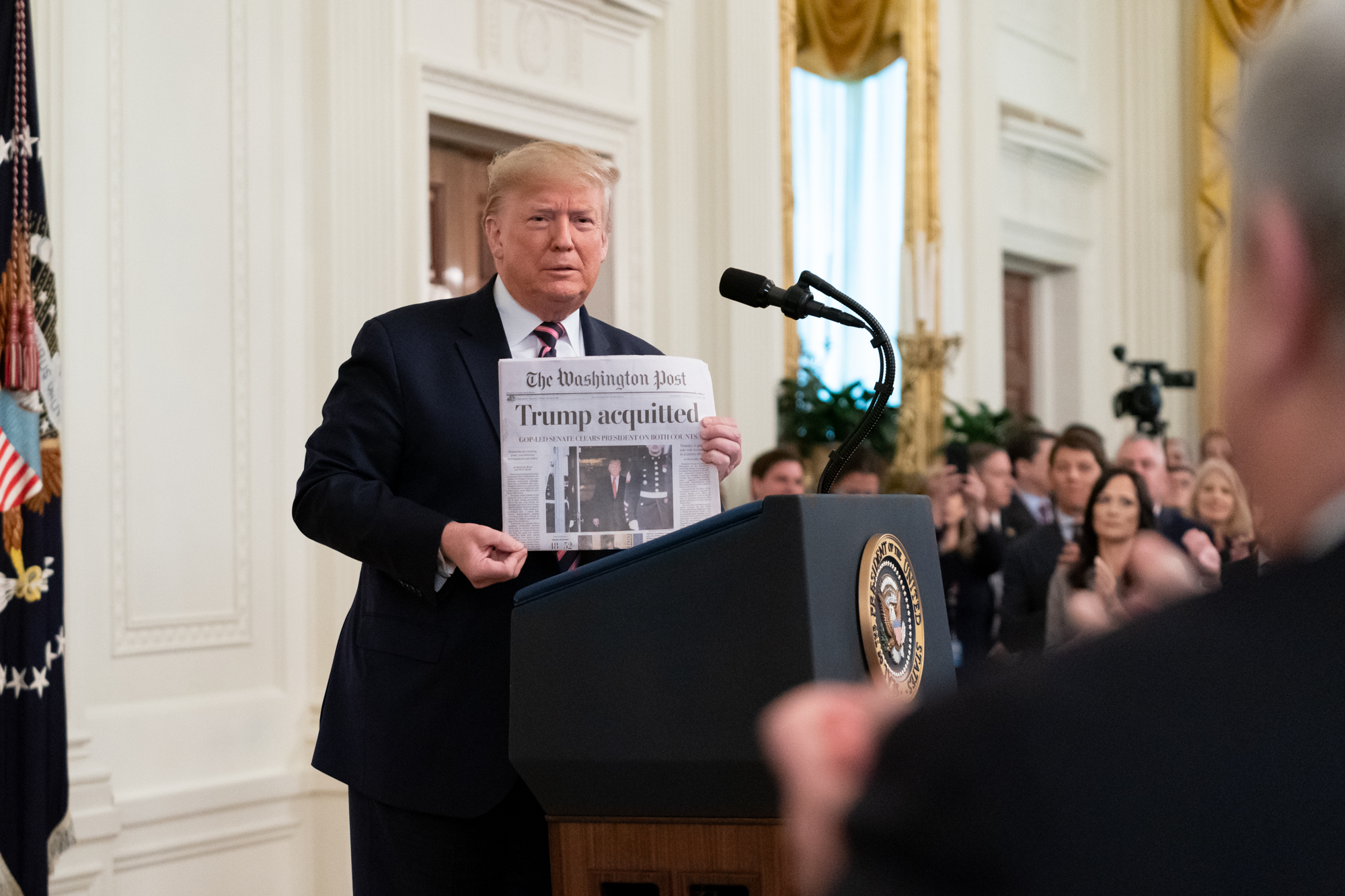How Trump’s Two Failed Impeachments Upended Checks and Balances
An excerpt adapted from the authors’ new book, “Unchecked: The Untold Story Behind Congress’s Botched Impeachments of Donald Trump” (William Morrow, 2022).

Published by The Lawfare Institute
in Cooperation With

Editor's note: This article is an excerpt adapted from the authors' new book, "Unchecked: The Untold Story Behind Congress's Botched Impeachments of Donald Trump," (William Morrow, 2022).
***
As the House Select Committee to Investigate the January 6th Attack on the United States Capitol winds down its long-running investigation, pundits and historians are debating its legacy—and whether the panel’s comprehensive findings and take-no-prisoners investigative approach will pave the way for holding former President Trump accountable.
The committee’s dedication to asserting Congress’s authority has been impressively unrelenting: Investigators not only convinced witnesses from Trump’s inner circle to come forward but also took those who ignored their subpoenas to court—even appealing to the Justice Department to arrest and charge those who would not comply with their summons.
But that track record has come in a uniquely favorable and lower-stakes environment: The president they are investigating is not in office anymore, and the one who replaced him is friendly to their cause. Such wins won’t dictate what may happen when an out-of-control executive branch needs checking by Congress—the most critical situation of all.
Instead, the strength of Congress’s oversight power in the face of an obstinate administration is atrophying, a trend exacerbated by the bungled impeachments of Donald Trump. And as we found through reporting our new book, “Unchecked: The Untold Story Behind Congress’s Botched Impeachments of Donald Trump,” there is blame to be shared on both sides of the aisle.
The story of how Trump overcame two impeachments and safeguarded his ability to make another run at the White House is, at its core, a story of how Congress repeatedly missed opportunities to check him. Republicans capitulated to political pressures and failed to act on their private revulsion with the president’s conduct, emboldening Trump and fueling the cult of personality around him at junctures when he might otherwise have been restrained. Despite myriad opportunities to change course, they doubled and tripled down on their fealty to Trump, protecting him when they could have sidelined him, thereby inuring a shock-fatigued public to the outrageousness of his increasingly dangerous behavior.
According to conventional wisdom, that is the beginning and the end of the story: Democrats, the thinking goes, simply couldn’t overcome the intransigence of Trump’s congressional lackeys, who defended him despite overwhelming evidence of his guilt. But while there is truth to that narrative, the reality of what occurred was far more complex. Trump escaped accountability not simply because his own party wouldn’t stand up to him but also because the opposing party was afraid to flex the full force of its constitutional muscle to check him.
Republicans didn’t just block and sabotage impeachment—Democrats never went all-in. Instead, they prioritized what they perceived as political security over the long, time-consuming course of bringing a rogue president to justice, fumbling their best chance to turn the American public away from Trump for good and compromising impeachment in the process.
Our reporting—based on more than 250 interviews with lawmakers, staffers and others involved in every chapter and political corner of the impeachments saga—indicates that during both impeachments, Democratic leaders pulled punches and took procedural shortcuts rather than prioritizing the fact-finding that might have persuaded the public to turn away from the president, even if it failed to compel 67 senators to convict. Led by a cautious Speaker Nancy Pelosi, who harbored deep skepticism about impeachment from the start, Democrats pursued the first impeachment at a breakneck tempo, giving themselves an artificial deadline of Christmas, which forced them to cut corners. That meant eschewing court fights for firsthand witnesses such as former National Security Adviser John Bolton, who could have testified to allegations that Trump tried to strong-arm Ukraine for political favors, and which would have affirmed the authority of congressional subpoenas over the Trump’s across-the-board stonewalling.
Democrats also threw out an impeachment tradition of giving the president unquestioned due process rights, over the protestations of House Judiciary Committee Chairman Jerry Nadler, who argued to impeachment leader Adam Schiff that it would be “unconstitutional” to put preconditions on Trump’s right to represent himself. In a further break from the Clinton and Nixon impeachments, Pelosi never reached out to Republican lawmakers to fashion the rules of the road for impeachment, as Democrats did while launching their probes of Richard Nixon and Bill Clinton—and even told her team it wasn’t worth trying to persuade Republican voters of Trump’s guilt.
Indeed, our reporting shows that House GOP leaders exploited both issues to keep wavering members of their rank and file in line, as they knowingly compromised the interests of Congress as an institution in order to defend Trump. Our book recounts early episodes in which GOP leaders gave up on attempts to convince the White House to comply with the impeachment probe, despite their concerns that they were crippling their legislative branch authority—and giving future presidents a ready excuse to make further power grabs. Still, they never criticized Trump’s stonewalling publicly. Our book also shows how GOP leaders twisted themselves into legal knots during the second impeachment to embrace a questionable “procedural offramp,” declaring that former presidents, even if impeached while in office, could not stand trial—a “January exception” that they did not fully believe in.
Our book demonstrates that, time and again, congressional leaders failed to learn from their mistakes, and repeatedly treated their oversight responsibilities and constitutionally derived power to impeach and convict as burdens too heavy to bear. Democrats, though vocally declaring throughout the first impeachment that trials without witnesses were anathema, worked to shut down Rep. Jamie Raskin’s attempt to summon Republican witnesses to testify during Trump’s second trial. They later folded their cards on a related lawsuit that they themselves had argued would affirm the power of a congressional subpoena, putting party unity over congressional authority. After two years of battling for former White House Counsel Don McGahn’s testimony, House Democrats settled the case without a final verdict from the Supreme Court, caving to pressure from the Biden administration, which, fearing a GOP takeover in Congress, saw the case as too great a threat to executive authority and autonomy. The GOP, meanwhile, sought to stamp out and bury any visible vestiges of their personal revulsion at Trump’s conduct, leaving GOP voters with the distinct impression that the former president had done nothing wrong.
The lawmakers who led the Trump impeachments have since rationalized these decisions as matters of political necessity. Democrats argue that the looming 2020 election forced them to work quickly through Trump’s first impeachment and his trial, and that they could not allow Trump’s second to overshadow the fledgling presidency of Joe Biden. For Republicans, meanwhile, Trump was simply too important a political galvanizing force to reject. But that doesn’t ameliorate the long-term detrimental effect of the decisions they made to hustle through impeachment, leaving their most formidable tools of oversight rejected or untested.
The result was more than two acquittals of Trump, permitting him to contemplate another run for office. The failed efforts exposed the devastating limits of Congress’s ability to check a president.
***
Impeachment, the only congressional oversight power explicitly referenced in the Constitution, is relatively undefined. Beyond a loose direction to use it as punishment for “treason, bribery, or other high crimes and misdemeanors,” there is no explicit guidance on how it ought to be wielded, save for precedent. That makes the experience of the two failed impeachments significantly influential, as they constitute half of all the completed presidential impeachments in U.S. history, and half of those that have even been attempted in modern times.
Historians and political scientists will likely study the two failed impeachments of Trump for decades to come and try to take lessons from them for the future. But based on our reporting, this period in history fundamentally altered the process of impeachment. Impeachment now appears destined to be primarily a political weapon instead of a constitutional failsafe to bring a president abusing office to justice.
Most Democrats have defended their impeachment efforts as successful, blaming the GOP for Congress’s ultimate failure to convict Trump and bar him from seeking future office. They argued that they did what they had to do, pointing to the fact that almost every Democrat in Congress agreed—twice—that Trump had to go, and that they secured the highest-ever number of votes to convict a president during his second trial. But party unanimity with occasional handfuls of crossover was not the standard to which impeachment was designed to appeal. The writers of the Constitution intended for impeachment to be a tool to remove a self-aggrandizing despot or would-be dictator from power.
To be sure, the Framers didn’t make that an easy task. By setting a two-thirds requirement for conviction, they essentially dictated that any impeachable infraction would have to be egregious on its face—or exposed as such through scrupulous and persuasive investigation. The power of impeachment, properly wielded, was envisioned as a daunting check on the executive, but also as a heavy responsibility for the would-be congressional accusers—which explains why, in the history of the country, it has been so seldom exploited.
But neither party was willing to assume that responsibility. Republicans made an early and fateful decision to help cripple Congress’s impeachment power when they endorsed the Trump administration’s stonewalling tactics—despite recognizing the long-term dangers of doing so. Democrats also contributed to the long-term damage when they declined to fight back with every mechanism at their disposal, eschewing opportunities to enforce their impeachment subpoenas through the courts—despite Nadler having said that doing so would, uniquely, unlock Congress’s “zenith power.” Instead, they shied away from court fights—retreats that suggested they didn’t believe in the strength of the congressional power they were wielding. When they encountered Republican resistance, they prioritized acting swiftly over fully, ignoring specific appeals for evidence if it proved too cumbersome to obtain.
Combined, these decisions created a new, unfortunate standard for impeachments that can easily be exploited in the future. There is now clear precedent for giving shortened shrift to the fact-finding process and for sidestepping key witnesses to an alleged constitutional crime. There is now clear precedent for presidents to stonewall and assume that impeachment subpoenas will not be enforced. There is arguably also clear precedent now for plowing ahead without buy-in from members of the president’s party—a standard that Nixon’s and Clinton’s impeachments upheld—and treating it as a box-checking exercise to please a political base. There is precedent for bypassing the custom of due process that says an accused president can cross-examine the witnesses against them before being impeached. And there is clear precedent for dismissing impeachments that come too close to the end of a presidency to do all the above.
House Democrats, to their credit, have endeavored to make some changes that will improve Congress’s posture come the next impeachment. In fact, before the ink had even dried on the first set of articles against Trump, they had started drafting a set of “post-Trump reforms” inspired by the series of laws that Congress passed after Watergate. The list, spearheaded by Adam Schiff, included requirements that courts rule quickly on interbranch disputes regarding oversight matters, limiting exploitation of the slow-moving judicial branch—a strategy that Trump had ably perfected. But while the package passed the House, it has stalled in the Senate, leaving the strategy of stonewalling ripe for future abuse.
Still, impeachment is at a critical crossroads. The lowered procedural and political threshold for indicting a president has dramatically increased the risk that the Constitution’s ultimate check on a president will soon be reduced to nothing more than a political messaging tool. With fewer bars to clear, the once-extraordinary process is at risk of becoming an everyday vehicle to express the heights of partisan rage instead of a failsafe to protect the American democratic order.
And the transition is already underway. During Biden’s first year in office, GOP lawmakers who had accused Democrats of pursuing half-baked vendettas filed a record-shattering six resolutions of impeachment against Biden—more than Democrats had filed at the same point in Trump’s presidency. Some cited the haphazard and chaotic withdrawal from Afghanistan in August 2021. Others fixated on policy disputes, expressing animus against Biden for things like stopping construction on Trump’s border wall or extending an eviction moratorium during the coronavirus pandemic—hardly the “high crimes and misdemeanors” standard articulated by the Founders. As Republicans eye a takeover of the House in 2023, there is every expectation that they will pursue some, if not all, of these avenues with the intention of giving Biden the black mark of impeachment, to level the playing field in what many anticipate could be a Biden-Trump rematch in 2024. And there is every reason to believe they will exploit and even replicate the corner-cutting strategies Democrats standardized to legitimate more highly politicized impeachment cases against Biden.
That should serve as a reminder that there is a potentially worse consequence of the debasement of impeachment that shouldn’t be overlooked: that a party with congressional supermajorities may one day oust a president based on no evidence at all. In other words, the most dangerous legacy of Trump’s impeachments is not that impeachment will become a broken, partisan battle cry that never works again—but that someday in the future, and for the first time in American history, it just might succeed, for all the wrong reasons.






